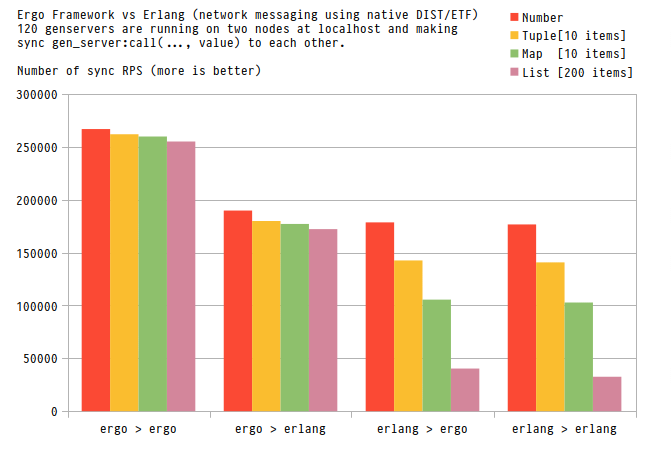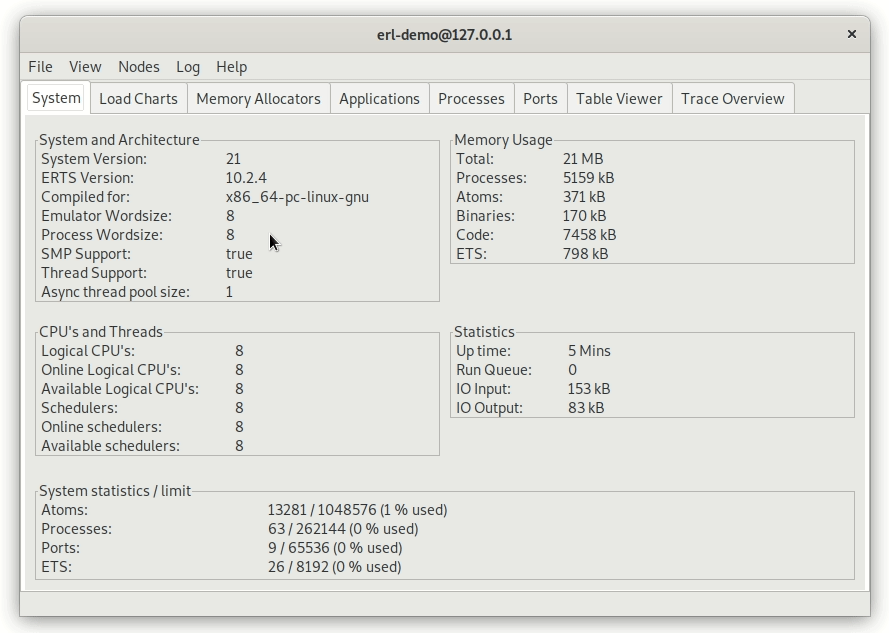Implementation of Erlang/OTP in Golang. Up to x5 times faster than original Erlang/OTP. The easiest drop-in replacement for your hot nodes in the cluster.
The goal of this project is to leverage Erlang/OTP experience with Golang performance. Ergo Framework implements OTP design patterns such as GenServer/Supervisor/Application and makes you able to create high performance and reliable application having native integration with Erlang infrastructure
- Erlang node (run single/multinode)
- embedded EPMD (in order to get rid of erlang' dependencies)
- Spawn Erlang-like processes
- Register/unregister processes with simple atom
GenServerbehavior support (with atomic state)Supervisorbehavior support (with all known restart strategies support)Applicationbehavior support- Connect to (accept connection from) any Erlang node within a cluster (or clusters, if running as multinode)
- Making sync/async request in fashion of
gen_server:callorgen_server:cast - Monitor processes/nodes
- local -> local
- local -> remote
- remote -> local
- Link processes
- local <-> local
- local <-> remote
- remote <-> local
- RPC callbacks support
- Experimental observer support
- Unmarshalling terms into the struct using etf.TermIntoStruct
- Support Erlang 22. (with fragmentation)
- Go 1.10 and above
- Highly recommend using 1.14.2 and above since it has significant performance improvements
Here is simple EndToEnd test demonstrates performance of messaging subsystem
Hardware: laptop with Intel(R) Core(TM) i5-8265U (4 cores. 8 with HT)
❯❯❯❯ go test -bench=NodeSequential -run=XXX -benchtime=10s
goos: linux
goarch: amd64
pkg: github.com/halturin/ergo
BenchmarkNodeSequential/number-8 256108 48578 ns/op
BenchmarkNodeSequential/string-8 266906 51531 ns/op
BenchmarkNodeSequential/tuple_(PID)-8 233700 58192 ns/op
BenchmarkNodeSequential/binary_1MB-8 5617 2092495 ns/op
BenchmarkNodeSequentialSingleNode/number-8 2527580 4857 ns/op
BenchmarkNodeSequentialSingleNode/string-8 2519410 4760 ns/op
BenchmarkNodeSequentialSingleNode/tuple_(PID)-8 2524701 4757 ns/op
BenchmarkNodeSequentialSingleNode/binary_1MB-8 2521370 4758 ns/op
PASS
ok github.com/halturin/ergo 120.720s
it means Ergo Framework provides around 25000 sync rps via localhost for simple data and around 4Gbit/sec for 1MB messages
❯❯❯❯ go test -bench=NodeParallel -run=XXX -benchtime=10s
goos: linux
goarch: amd64
pkg: github.com/halturin/ergo
BenchmarkNodeParallel-8 2652494 5246 ns/op
BenchmarkNodeParallelSingleNode-8 6100352 2226 ns/op
PASS
ok github.com/halturin/ergo 34.145s
these numbers shows around 260000 sync rps via localhost using simple data for messaging
sources of these benchmarks are here
Ergo Framework has embedded EPMD implementation in order to run your node without external epmd process needs. By default it works as a client with erlang' epmd daemon or others ergo's nodes either.
The one thing that makes embedded EPMD different is the behavior of handling connection hangs - if ergo' node is running as an EPMD client and lost connection it tries either to run its own embedded EPMD service or to restore the lost connection.
As an extra option, we provide EPMD service as a standalone application. There is a simple drop-in replacement of the original Erlang' epmd daemon.
go get -u github.com/halturin/ergo/cmd/epmd
This feature allows create two or more nodes within a single running instance. The only needs is specify the different set of options for creating nodes (such as: node name, empd port number, secret cookie). You may also want to use this feature to create 'proxy'-node between some clusters. See Examples for more details
It allows you to see the most metrics/information using standard tool of Erlang distribution. The example below shows this feature in action using one of the examples:
Here are the changes of latest release. For more details see the ChangeLog
1.1.0 - 2020-04-23
- Fragmentation support (which was introduced in Erlang/OTP 22)
- Completely rewritten network subsystem (DIST/ETF).
- Improved performance in terms of network messaging (outperforms original Erlang/OTP up to x5 times. See Benchmarks)
Code below is a simple implementation of GenServer pattern examples/simple/GenServer.go
package main
import (
"fmt"
"time"
"github.com/halturin/ergo"
"github.com/halturin/ergo/etf"
)
type ExampleGenServer struct {
ergo.GenServer
process ergo.Process
}
type State struct {
value int
}
func (egs *ExampleGenServer) Init(p ergo.Process, args ...interface{}) (state interface{}) {
fmt.Printf("Init: args %v \n", args)
egs.process = p
InitialState := &State{
value: args[0].(int), // 100
}
return InitialState
}
func (egs *ExampleGenServer) HandleCast(message etf.Term, state interface{}) (string, interface{}) {
fmt.Printf("HandleCast: %#v (state value %d) \n", message, state.(*State).value)
time.Sleep(1 * time.Second)
state.(*State).value++
if state.(*State).value > 103 {
egs.process.Send(egs.process.Self(), "hello")
} else {
egs.process.Cast(egs.process.Self(), "hi")
}
return "noreply", state
}
func (egs *ExampleGenServer) HandleCall(from etf.Tuple, message etf.Term, state interface{}) (string, etf.Term, interface{}) {
fmt.Printf("HandleCall: %#v, From: %#v\n", message, from)
return "reply", message, state
}
func (egs *ExampleGenServer) HandleInfo(message etf.Term, state interface{}) (string, interface{}) {
fmt.Printf("HandleInfo: %#v (state value %d) \n", message, state.(*State).value)
time.Sleep(1 * time.Second)
state.(*State).value++
if state.(*State).value > 106 {
return "stop", "normal"
} else {
egs.process.Send(egs.process.Self(), "hello")
}
return "noreply", state
}
func (egs *ExampleGenServer) Terminate(reason string, state interface{}) {
fmt.Printf("Terminate: %#v \n", reason)
}
func main() {
node := ergo.CreateNode("node@localhost", "cookies", ergo.NodeOptions{})
gs1 := &ExampleGenServer{}
process, _ := node.Spawn("gs1", ergo.ProcessOptions{}, gs1, 100)
process.Cast(process.Self(), "hey")
select {
case <-process.Context.Done():
fmt.Println("exited")
}
}here is output of this code
$ go run ./examples/simple/GenServer.go
Init: args [100]
HandleCast: "hey" (state value 100)
HandleCast: "hi" (state value 101)
HandleCast: "hi" (state value 102)
HandleCast: "hi" (state value 103)
HandleInfo: "hello" (state value 104)
HandleInfo: "hello" (state value 105)
HandleInfo: "hello" (state value 106)
Terminate: "normal"
exitedSee examples/ for more details
Users of the Elixir Phoenix framework might encounter timeouts when trying to connect a Phoenix node to an ergo node. The reason is that, in addition to global_name_server and net_kernel, Phoenix attempts to broadcast messages to the pg2 PubSub handler
To work with Phoenix nodes, you must create and register a dedicated pg2 GenServer, and spawn it inside your node. Take inspiration from the global_name_server.go for the rest of the GenServer methods, but the Spawn must have "pg2" as a process name:
type Pg2GenServer struct {
ergo.GenServer
}
func main() {
// ...
pg2 := &Pg2GenServer{}
node1 := ergo.CreateNode("node1@localhost", "cookies", ergo.NodeOptions{})
process, _ := node1.Spawn("pg2", ergo.ProcessOptions{}, pg2, nil)
// ...
}There is a couple of options are already defined that you might want to use
- -trace.node
- -trace.dist
To enable Golang profiler just add --tags debug in your go run or go build like this:
go run --tags debug ./examples/genserver/demoGenServer.go
Now golang' profiler is available at http://localhost:9009/debug/pprof
is your company using Ergo? add your company logo/name here
if you are looking for commercial support feel free to contact me via email (halturin at gmail dot com)





